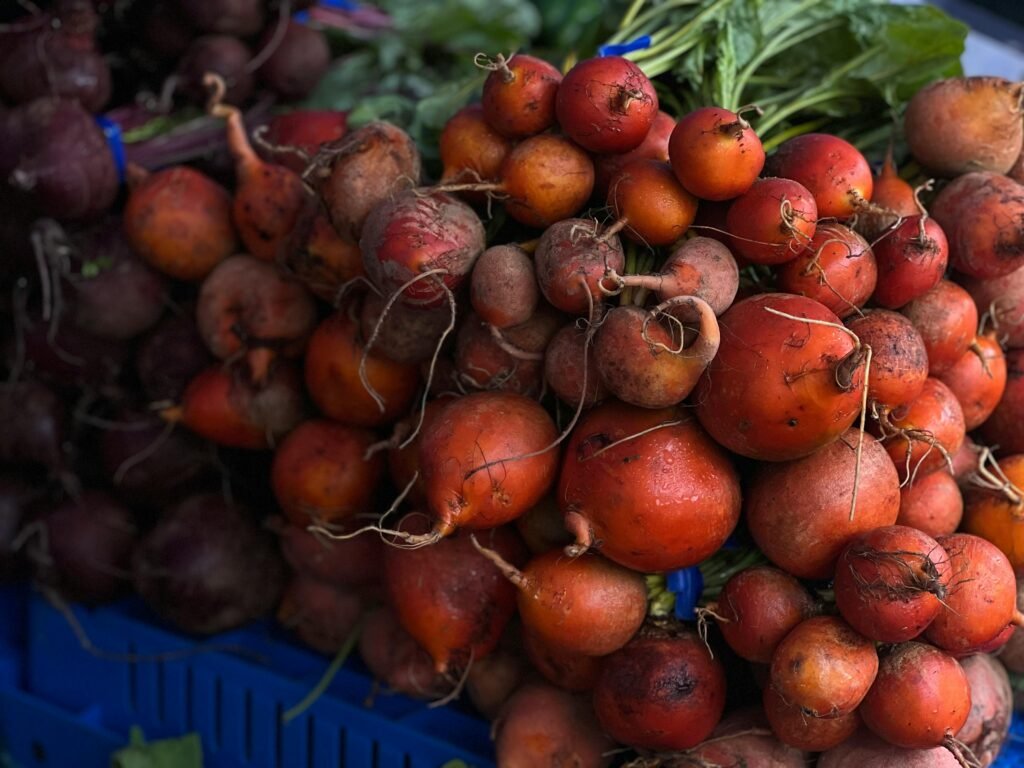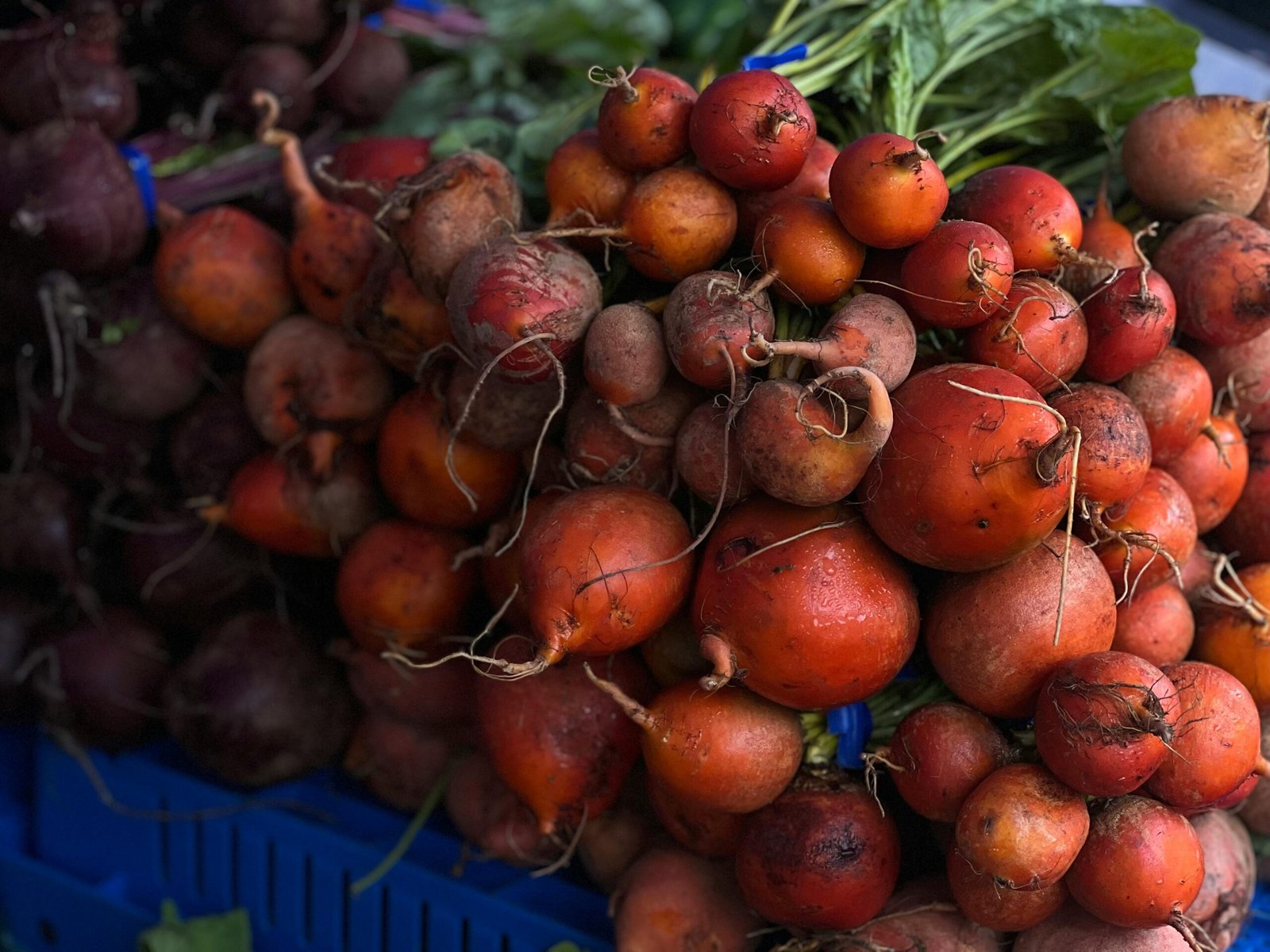
Overview
Beets are much more than a colorful root vegetable; they are a treasure trove of nutrients with a wide range of health benefits. From lowering blood pressure to improving athletic performance, beets are gaining recognition as a superfood. Whether consumed raw, roasted, or juiced, beets are a versatile ingredient that can elevate both your meals and your health. This comprehensive guide dives into the nutritional profile, health benefits, and creative ways to incorporate beets into your diet
Related : Health Benefits of Ginger
Nutritional of Beets
Beets are low in calories yet loaded with essential nutrients. A 3.5-ounce (100-gram) serving of boiled beetroot provides:
- Calories: 44
- Protein: 1.7 grams
- Fat: 0.2 grams
- Carbohydrates: 10 grams
- Fiber: 2 grams
- Folate: 20% of the Daily Value (DV)
- Manganese: 14% of the DV
- Copper: 8% of the DV
- Potassium: 7% of the DV
- Magnesium: 6% of the DV
- Vitamin C: 4% of the DV
- Folate: Essential for cell growth and heart health.
- Manganese and Copper: Vital for bone health, brain function, and energy production.
- Nitrates: Compounds that improve blood flow and oxygen delivery
Health Benefits of Beets
Related : Allergies: Symptoms, Types, Causes, and Management
- Lower Blood Pressure
Beets are rich in nitrates, which convert to nitric oxide in the body. This compound relaxes blood vessels, improving circulation and reducing blood pressure. Studies have shown that regular consumption of beet juice can lower systolic and diastolic blood pressure, reducing the risk of heart disease and stroke.
- Support Digestive Health
Beets are a good source of dietary fiber, with one cup providing about 3.4 grams. This fiber promotes a healthy gut by feeding beneficial bacteria, improving digestion, and preventing issues like constipation and inflammatory bowel disease.
- Boost Endurance and Athletic Performance
Athletes often use beet juice to enhance performance. The nitrates in beets improve oxygen flow to muscles, increasing stamina and reducing recovery time. Research shows that consuming beetroot juice before exercise can lead to better endurance and reduced fatigue.
- Anti-Inflammatory Properties
The pigments in beets, known as betalains, have powerful anti-inflammatory effects. These compounds may help manage chronic inflammation associated with conditions like arthritis, heart disease, and cancer. Betalains are also known to reduce joint pain and stiffness in osteoarthritis patients.
- Improve Brain Function
Nitrates in beets enhance blood flow to the brain, particularly to areas responsible for decision-making and memory. This increased circulation may improve cognitive function and lower the risk of neurodegenerative disorders such as dementia.
- Support Liver Health
Beets contain betaine, an antioxidant that helps reduce liver fat and protect against toxins. This makes them particularly beneficial for those at risk of liver diseases like non-alcoholic fatty liver disease (NAFLD)
Related : Lifestyle Advice for Heart Health
- Potential Anti-Cancer Properties
Beets contain bioactive compounds like betaine, ferulic acid, and caffeic acid, which have shown anti-cancer properties in laboratory studies. While more research is needed, these compounds may help slow the growth of certain cancer cells.
Beets and Skin Health

Beetroot juice can improve blood circulation and reduce inflammation, both of which contribute to healthier, glowing skin. The antioxidants in beets also combat oxidative stress, which can reduce signs of aging like wrinkles and fine lines. Regular consumption may lead to a clearer complexion and improved skin elasticity.
Delicious Ways to Incorporate Beets into Your Diet
Beets are not only nutritious but also versatile and easy to prepare. Here are some creative ways to enjoy them:
- Salads
Grate raw beets into a salad or toss roasted beet slices with arugula, goat cheese, and walnuts for a delicious dish.
- Juices
Combine fresh beet juice with carrots, apples, and ginger for a refreshing, nutrient-packed drink.
- Soups
Prepare a hearty borscht or beetroot-tomato soup for a warm, comforting meal.
- Dips
Blend roasted beets with Greek yogurt, garlic, and lemon juice to create a vibrant and creamy dip.
- Roasted Beets
Toss beet wedges with olive oil, salt, and rosemary, then roast them for a caramelized side dish.
- Beet Greens
The leafy tops of beets are rich in nutrients and can be sautéed with garlic and olive oil for a healthy side
Related : Foods and Drinks to Soothe a Sore Throat
Scientific Insights and Research
Numerous studies back the health benefits of beets. For example
A 2015 study published in Hypertension found that drinking beet juice significantly reduced blood pressure in hypertensive patients.
Research in Nutrients highlighted the role of dietary nitrates in improving athletic performance and cardiovascular health.
A 2014 study in Nutritional Neuroscience linked beet consumption to improved brain function and cognitive health.
These findings reinforce the importance of including beets in a balanced diet
Related : How Much Sugar Should You Eat Per Day?
Are There Any Risks?
While beets offer numerous health benefits, excessive consumption may have some downsides:
- Beeturia: A harmless condition where urine turns red or pink after eating beets.
- Kidney Stones: Beets are high in oxalates, which can contribute to kidney stone formation in susceptible individuals.
- Blood Sugar: Though beets have a low glycemic index, people with diabetes should consume them in moderation due to their natural sugars.
Consult your healthcare provider if you have concerns about adding beets to your diet.
The Takeaway
Beets are a nutritional powerhouse with a wide array of health benefits, from improving heart and brain health to boosting endurance and supporting liver function. Their vibrant color, rich taste, and versatility make them a fantastic addition to any meal.
Whether you prefer them raw in salads, blended into smoothies, or roasted to perfection, incorporating beets into your diet can significantly enhance your overall health. Start experimenting with beets today and enjoy the benefits of this remarkable superfood
FAQs About the Health Benefits of Beets
- Are beets good for weight loss?
Yes, beets can support weight loss as they are low in calories and high in fiber. The fiber in beets helps you feel fuller for longer, reducing overall calorie intake. Additionally, their natural sweetness makes them a healthier alternative to processed sugary snacks.
- How much beet juice should I drink daily to lower blood pressure?
Studies suggest drinking about 1 cup (250 ml) of beet juice daily to see significant reductions in blood pressure. However, consult your doctor before adding beet juice to your routine, especially if you are on blood pressure medications.
- Can I eat beet greens?
Yes, beet greens are not only edible but also highly nutritious. They are rich in vitamins A, C, and K, as well as minerals like potassium and magnesium. You can sauté them, add them to soups, or blend them into smoothies for a healthy boost.
- Are there any side effects of eating beets?
Beets are safe for most people but can cause harmless beeturia (red or pink urine) in some individuals. People prone to kidney stones should moderate their beet consumption due to their oxalate content. Always consult a healthcare provider if you have specific dietary concerns.












